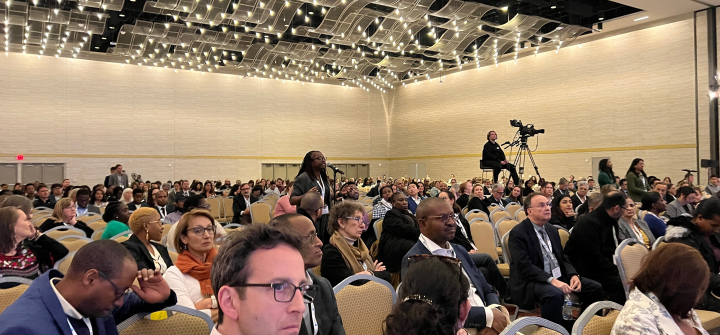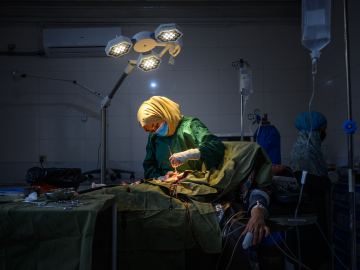The Topic Everyone Was Talking About at CUGH 2025
ATLANTA—In hallways, sessions, keynotes, and receptions, one topic dominated last week’s 2025 Consortium of Universities for Global Health (CUGH) conference.
No surprise: It was the rapid change in U.S. government research funding and support for keystone global health programs like PEPFAR.
Worry, wariness, and uncertainty mixed with resilient commitments to the global health mission as the 1,300+ conference attendees from 61 nations gathered to share the latest knowledge gleaned from research worldwide.
“When many people feel bereft and are fearful of what the future may hold, CUGH 2025 provided an opportunity to provide a positive path forward [and] show that we have a robust community that will stick together, will support each other,” said Keith Martin, CUGH executive director. “At CUGH, we will oppose that which needs to be opposed and work together with our members to reform global health so that it is more effective in improving the lives of people, particularly those who are most vulnerable in this world.”
New Challenges
During a Sunday, Feb. 23 panel about how the global health community should respond to recent challenges, Sofia Gruskin invoked Albert Einstein’s quote that within every crisis is an opportunity. “I think right now is a great crisis, so it's a great opportunity, right?” said Gruskin, director of the University of Southern California’s Institute on Inequalities in Global Health.
The great opportunity, according to Gruskin, is to improve the already “shaky” global public health system. “The U.S. withdrawal or threat of withdrawal from the World Health Organization is starting to make much more explicit the fragility of global health governance,” she said. “The shock of one country doing this should not shake the system to its core in the way that it has, and that is something [that] all of us in all parts of the world we need to think about.”
A colleague recently told Gruskin that 35,000 people in Kenya alone had lost their jobs in the past month due to U.S. government funding changes and that most organizations were not reopening. “Everybody's scared,” she said, calling on attendees to support their civil society partners and work together. “Universities are part of a global health ecosystem. We are not the ecosystem, right? So, we have to think about our different roles moving forward.”
The current moment should encourage global health organizations to do a better job of engaging politicians and policymakers, argued panelist Nelson Sewankambo, former dean of Makerere Medical School in Uganda. “If I asked, how many here are politicians? I would be surprised if we would get a handful,” Sewankambo said. “How can we … [leave] out that very important group to learn and hear and share the ideas that are exchanged here?”
Panelist Susan Michaels-Strasser reflected on global health’s demonstrable advances during her career. As a nurse in the late 1980s in Zimbabwe, she worked in a hospital that was full of patients dying from AIDS. But today, she notes, some countries in Africa have reached epidemic control, meaning that 95% of people living with HIV have been diagnosed, 95% of them are in treatment, and 95% of those in treatment have achieved viral suppression.
“What I most want … to say is that we have a moral imperative,” said Michaels-Strasser, senior director of ICAP at the Columbia University Mailman School of Public Health. “We have an ethical obligation to ensure that lifeline of antiretrovirals continues to treat people and to prevent mother to child transmission, transmission between discordant couples, and to all people at risk of HIV infection.”
The Great Debate
The conference’s annual debate on Saturday, Feb. 22, centered on whether academia should be involved in politics. Moderator Tom Quinn framed the discussion with a recap of executive orders from the new U.S. administration in the last month affecting USAID, NIH, CDC, and other agencies.
A pre-debate show-of-hands revealed a great majority supported the idea of academia being involved in politics.
Sewankambo argued persuasively that academics have a responsibility to participate in politics. By doing so, they can shape the policy landscape “to protect democratic principles and human rights,” he said.
“Academics can act as credible sources, clarifying misconceptions and challenging misinformation,” Sewankambo said. “Political engagement gives experts [a] platform to correct falsehoods, ensuring our decisions are based on accurate understanding rather than viral rumor.”
Judd Walson, chair of International Health at the Johns Hopkins Bloomberg School of Public Health, gamely took on the uphill challenge of overturning the popular proposition. Walson based his argument on the distinction between academia and academics.
He argued passionately that academia shouldn’t engage in politics, but academics should. Walson noted that academia made many stands on the “on the wrong side of political history” in the past, including “opposing women’s rights, supporting the notion that homosexuality is a mental illness, propagating the theory of eugenics, advocating for racial segregation, supporting medical experimentation on marginalized groups.” In each case, academia had responded to an urgent demand to “enforce these ‘truths,’” Walson said.
“We must be careful that we do not repeat this past,” he argued. “The role of the academia is not to broker the truth—it is to allow space for all truths to be debated and discussed—and by doing so, to strengthen the social fabric through inclusion of thought.”
Acknowledging the desire for a collective response to defend the value of science, foreign aid, and human humanitarian assistance, Walson advocated for individual action instead. “The academy plays an incredibly vital role in our democracy and in our society. We must resist the urge to corrupt that role in pursuit of immediate ends,” he said. “As individuals, by all means, stand up, shout, cry, advocate, but as an academy, let us stay strategically silent.”
After the debate and comments from the audience, Quinn, director of the Johns Hopkins Center for Global Health, called for a new show-of-hands. Walson had won some converts but the majority held to their initial preference that academia should be involved in politics.
Join the 50,000+ subscribers in 170+ countries who rely on Global Health NOW summaries and exclusive articles for the latest public health news. Sign up for our free weekday newsletter, and please share the link with friends and colleagues.
Hundreds of CUGH 2025 attendees gather on Feb. 22, 2025, for the annual great global health debate. Brian W. Simpson





